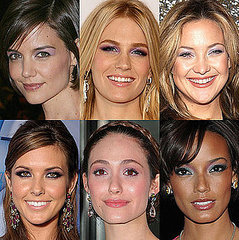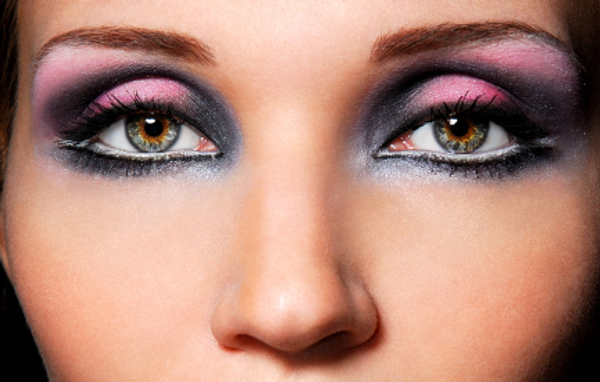Eye shadow adds depth and dimension to one's eyes, complements the eye color, or simply draws attention to the eyes. Eye shadow comes in many different colors and textures. It is usually made from a powder and mica, but can also be found in liquid, pencil, or mousse form.
In Gothic fashion, black or similarly dark-colored eye shadow and other types of eye makeup are popular amongst both genders.
Many people use eye shadow simply to improve their appearance, but it is also commonly used in theatre and other plays, to create a memorable look, with bright and even ridiculous colors. Depending on skin tone and experience, the effect of eye shadow usually brings out glamor and gains attention. The use of eye shadow attempts to replicate the natural eye shadow that some women exhibit due to a natural contrasting pigmentation on their eyelids. Natural eye shadow can range anywhere from a glossy shine to one's eyelids, to a pinkish tone, or even a silver look.
Eye shadow can be applied in a variety of ways depending upon the desired look and formulation. Typically application is done using fingers or brushes. The most important aspect of applying eye shadow, and makeup in general, is blending well.
To remove eye shadow, a commercial eye makeup remover can be utilized, though a rich face wash will usually remove all traces of color. Generally it is easy to remove, and simple water and soap can be used. Eye shadow, eyeliner, and mascara may also be removed using baby oil. There are also makeup wipes that can be used. An example would be Neutrogena Wipes for the face.
Cosmetics have been used for as long as there have been people to use them. Face painting is mentioned in the Old Testament (Book of Ezekiel 23:40 ) and eye shadow was used in Egyptian burials dating back to 10,000 BC. The word "cosmetae" was first used to describe Roman slaves whose duty was to bathe men and women in perfume.
As early as 10,000 BC, men and women used scented oils and ointments to clean and soften their skin and mask body odor. Dyes and paints were used to color the skin, body and hair. They rouged their lips and cheeks, stained their nails with henna, and lined their eyes and eyebrows heavily with kohl. Kohl was a dark-colored powder made of crushed antimony, burnt almonds, lead, oxidized copper, ochre, ash, malachite, and chrysocolla (a blue-green copper ore) or any combination thereof. It was applied with a small stick. The upper and lower eyelids were painted in a line that extended to the sides of the face for an almond effect. In addition to reducing sun glare, it was believed that kohl eyeliner could restore good eyesight and reduce eye infection. Kohl was kept in a small, flat-bottomed pot with a wide, tiny rim and a flat, disk-shaped lid. According to images of the time, the use of makeup was not limited to women. Highly polished silver and copper mirrors aided the application of makeup. In Greece, precious oils, perfumes, cosmetic powders, eye shadows, skin glosses, paints, beauty unguents, and hair dyes were in universal use. Export and sale of these items formed an important part of trade around the Mediterranean. During the 7th and 8th centuries BC, Corinthian, Rhodian and East Greek traders dominated markets in perfume flasks and cosmetic containers. The containers included aryballoi, alabastra, pyxides and other small specialized shapes. Men and women in the Near East painted their faces with kohl just like the Egyptians did. This was to protect them from the 'evil eye.' After the defeat of the Greeks by the Romans, the original Egyptian intention suffered its final bastardization beyond any reasonable recovery. The Romans were unabashedly hedonistic; Egyptian oils that were once used for sacred purposes became nothing more than sexual accoutrements in Rome.[citation needed] There was some dignity amended when the Romans discovered medicinal applications as well. Plagues were so rampant throughout Rome, that aromatic gums and resins were burned to repel demons and bad spirits.
In Gothic fashion, black or similarly dark-colored eye shadow and other types of eye makeup are popular amongst both genders.
Many people use eye shadow simply to improve their appearance, but it is also commonly used in theatre and other plays, to create a memorable look, with bright and even ridiculous colors. Depending on skin tone and experience, the effect of eye shadow usually brings out glamor and gains attention. The use of eye shadow attempts to replicate the natural eye shadow that some women exhibit due to a natural contrasting pigmentation on their eyelids. Natural eye shadow can range anywhere from a glossy shine to one's eyelids, to a pinkish tone, or even a silver look.
 Stila Eye Shadow in Twig which |  Purple Eye Shadow |  purple eye shadow—ranging |  Eyeshadow Looks |  they say purple eyeshadow |
 The return of purple eyeshadow |  Purple also makes green eyes |  Purple makeup is one of the |  Purple eye shadow |  REAL treat on brown eyes. |
Cosmetics have been used for as long as there have been people to use them. Face painting is mentioned in the Old Testament (Book of Ezekiel 23:40 ) and eye shadow was used in Egyptian burials dating back to 10,000 BC. The word "cosmetae" was first used to describe Roman slaves whose duty was to bathe men and women in perfume.
Emma Stone Aubergine eyes |  Purple Eye Shadow Beauty |  Wear Purple Eyeshadow |  Here Thandie is wearing purple |  how to apply eyeshadow. |
 or purple eye shadow is |  Eyes: Smoke Signal pigment |  Purple Eyeshadow for Brown |  FOTD: Purple Eyeshadow |  Regular Bikini Wax |
No comments:
Post a Comment